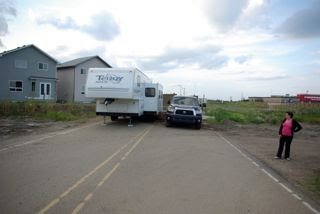 |
| Sharing the rest stops |
It is difficult to keep “Blogging” when I am not travelling. It seems that there are always things that have to be done, and sitting down to write is not one of the “important” things.
I thought you might enjoy a brief summary of the RV trip now that it is over.
 |
| You have to be able to see |
In general terms, we went from Nova Scotia to British Columbia, but we certainly did not take the most direct route – where is the fun in that? We started in Nova Scotia, but went on a gentle South Western path that took us through the middle of the United States. We went as far south as the Grand Canyon and Flagstaff Arizona before turning north again and heading up through California to get to Vancouver Island. Coming home we did take a more direct route, through western Canada, down to North Dakota and under the Great Lakes to Michigan, then back into Ontario and finally on home to the East Coast again.
When we got home, we went back over the maps and traced our route into the Road Atlas we used as a general guide and I then wrote little short daily notes about routes, stops and campgrounds. We have done the “Cross-country” trip twice before, but I could not tell you our exact route, so this time I tried to keep better notes. Using these notes and my journal, I can give you some interesting information about the trip.
 |
| Our "Rig" is only big on it's own. |
We did approximately 18,000 km in total distance driven. I had good intentions to have an exact amount, as I zeroed both the A and B trip odometers, planning to use A for each tankful of fuel and keep B running for the entire trip. Somehow B got zeroed along the way, so I have had to simply add the distances recorded for each fill-up. This of course counts all mileage including local trips at each stop.
We were gone from June 29th until August 27th, for a total of 60 days.
We drove through seven provinces, Nova Scotia, New Brunswick, British Columbia, Alberta, Saskatchewan, Ontario and Quebec. We visited twenty five states, including Maine, New Hampshire Massachusetts, Connecticut, New York, New Jersey, Pennsylvania, Ohio, Kentucky, Indiana, Illinois, Missouri, Arkansas, Oklahoma, Texas, New Mexico, Arizona, Nevada, California, Oregon, Washington, North Dakota, Minnesota, Wisconsin, and Michigan.
 |
| A Racing Tundra! |
We crossed the Canada/US border four times at four different places, New Brunswick/Maine, Washington/British Columbia, Saskatchewan/North Dakota, and Michigan/Ontario. We had to turn in our oranges and tomatoes each time we entered the US, but Canada did not seem to mind anything we imported. Crossing the border this many times on one trip did present some questions. For example, I brought two bottles of wine and some nice local beers across when I entered Canada in British Columbia, and I wanted to keep these until I got home. I asked the border officials and they did not seem to mind. I kept the receipts for things I bought the first section of the trip and if questioned I could have shown the different items, but the border officials accepted my explanation and I had no problems.

We visited thirty three different campgrounds in total, spent two nights in Walmart parking lots and the rest parked in friends or family yards. The longest time spent in one place was at my sister's house on Vancouver Island where we spent six days. The longest campground stop was in Vancouver for five days visiting friends followed by four days in California waiting for new springs for the trailer. Most of these campgrounds were very nice thanks to our diligent “Trip Planner” who researched and reviewed prior to choosing. We had one really bad one, and perhaps two that were “not so good”. We belong to an RV campground service called Passport America that lists discounted campgrounds at 50% off, but we quickly discovered that most of these are in the list because they are well off the main routes, and the savings are eliminated when the extra fuel and time to find them are factored in. We found that in general, the KOA campgrounds are reliable and high quality, if somewhat more expensive. We reserved a spot at many campgrounds, but in general found that campgrounds were not full. The exception to this was in Oregon and Washington where we found everything packed full.
I am not going to give costs of the trip. Fuel was the major expense; the truck gets about 10 MPG towing the trailer, and unless you get a strong tail wind like we had in North Dakota nothing makes much difference. You could tow up mountains, or through cities without a big difference, and I was amazed at how reliable and dependable the truck was. We were surprised at the cost of some campgrounds almost approaching the price of a motel, but in general you pay about $40 - $50 per night. Most campgrounds now have Wi-Fi available throughout the sites, but the quality of the service is spotty. The biggest saving comes with the food. If you cook your own meals in the RV, and plan for lunches on the road in the RV, food is not expensive, but you have to resist the urge to try the wonderful restaurants written up in the tourist information packages.
So, if you are planning a trip across the country . . . . I know the way.







































